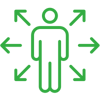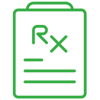As information surrounding COVID-19 continues to evolve, we remain focused on providing quality care and relevant information. We have already sent out several communications, and we will continue to as we have more to share. We also want you to know that we are working tirelessly to educate ourselves on the best options available. We hope that the following information brings you clarity, and answers most of your questions.
Q: What should I know about the virus?

A: Great question! We’re learning more and more, and knowledge is power.
- The virus is not a sentient organism, but rather a collection of proteins covered by a protective lipid layer (essentially, fat). When absorbed by the cells of the mucosa around the eyes, nostrils or mouth, it hijacks their genetic code and converts them into aggressor and multiplier cells. The virus cannot go through healthy skin. It requires you to touch your eyes, nose or mouth where there are mucosa.
- Being a protein molecule, the virus is not "killed," but actually decays on its own. The disintegration time depends on the temperature, humidity and the material it is on.
- Since the only thing protecting it is a thin layer of fat, the virus is very fragile. This is why soaps and detergents are such great options. You’ve probably heard that it’s important to rub your hands together for 20 seconds or more when washing. This is because the foam can successfully dissolve the fat layer. In short, the more foam, the better. Once the fat layer dissolves, the protein molecule will break down on its own.
- A mixture with over 70% alcohol will dissolve the outer layer of the virus. It’s recommended to apply the cleaning solution and leave on for 30 seconds before wiping off. Pure (100%) alcohol evaporates too quickly for this purpose and is not recommended.
- If you use bleach, use one-quarter cup of bleach per 1 gallon of cold water, but be sure to follow the instructions on the product label. Make the diluted bleach solution as needed and use within 24 hours, as its disinfecting power fades with time. Non-porous items like plastic toys can be immersed in bleach for 30 seconds. Household surfaces that won’t be damaged by bleach should get 10 or more minutes of exposure.
- Hydrogen peroxide is typically sold in concentrations of about 3%. It can be used as is, or diluted to 0.5% concentration for effective use against coronaviruses on surfaces. It should be left on surfaces for one minute before wiping.
- Vinegar, tea tree oil and other natural products are not recommended for fighting coronaviruses.
Q: What can I personally do to protect myself and others?

A: As always, take care of your body and mind! Make sure you’re getting enough sleep, washing your hands frequently, refraining from touching your face, maintaining social distancing of 6 feet, and continuing your self-care routines. We know this is a stressful time for all, so we encourage you to take moments for yourself and your family to stay healthy and positive.
Q: How can Pravan help me?

A: Having access to your medical team is priceless in these times of crisis. Since minimizing your contact with others remains incredibly important, we’re working on ways to support this. Our entire medical team and staff are working full-time and after-hours to best manage the ongoing situation.
Telemedicine: We are currently promoting essential services for our members, and are primarily attending them through telemedicine appointments. Pravan has had one of the most robust telemedicine platforms in the island since 2017. We have served hundreds of members during this crisis.
E-prescriptions & Delivery Services: We currently have a courier option for those who need to re-stock their supplements, or who require a hand-written prescription that would otherwise require them to visit the clinic. We are sending e-prescriptions, as always, and are also working with a pharmacy that offers delivery for prescriptions.
Urgent Care: Our popular 24/7 urgent care service continues to operate regularly for our members in case of an urgency.
Beyond this, we are working behind the scenes to provide the best options for care. We are building additional relationships with labs, pharmacies and hospitals to ensure that our members have access to what they need, when they need it.
Q: What should I do if I develop a fever or mild respiratory symptoms (fatigue, shortness of breath, cough, sore throat)?

A: You should contact your physician immediately so that they can evaluate you and provide you with medical guidance and/or recommend a telemedicine encounter.
Q: Can I be tested for COVID-19?

A: Yes, you can. In our clinic we are evaluating our patients by telemedicine to determine if testing is appropriate. In the event it is we will order the test and assist in coordinating the process with the lab.
It’s important for you to know that we are following the Infectious Diseases Society of America’s hierarchical approach to testing. It has divided patients into four tiers: from first (highest) priority, second priority, third priority, and fourth priority. Patients without symptoms are in the last (fourth) tier. Due to the shortage of available tests, we feel that prioritizing testing is necessary at this time. For this reason, we are only ordering tests for symptomatic patients who meet the criteria for testing. We are constantly evaluating this position and will adjust our practices if anything changes.
Q: What can I do to manage my symptoms?

A: Since there is no known cure for the virus at this time, the only “cure” is to allow our immune systems time to fight the virus. If you do develop symptoms, a general recommendation is to drink plenty of fluids. Drink enough water so that your urine is a pale, clear color. You can also take supplements such as Vitamin C and Zinc to support your immune system. Avoid alcohol, as this will make you more dehydrated. Get plenty of rest, eat healthy food, and avoid any strenuous activity while you are unwell.
Q: What medications can be prescribed to help me fight symptoms?

A: Since people are affected differently by this virus it’s important to manage symptoms on a case-by-case basis. There is no one-size-fits-all when you're providing personalized care. Our physicians are making recommendations based on symptoms and their severity, and adjusting as necessary if anything changes. In case medications are prescribed we are recommending that someone else picks them up and leaves them at your door, or that you utilize a delivery service to bring medications directly to you.
You can use over-the-counter medications to treat some of your symptoms such as antihistamines, decongestants and cough suppressants. The use of non-steroidal anti-inflammatory drugs (NSAIDs), such as ibuprofen, could worsen coronavirus disease (COVID-19). This is based on information from The Lancet Medical Journal, which hypothesized that an enzyme (a molecule that aids a biochemical reaction in the body) is increased by NSAIDs and could aggravate COVID-19 symptoms. Any other specific medication recommendations should be made for you depending on your symptoms and their severity.
We've heard from many of our patients who are interested in getting prescriptions for chloroquine and hydroxychloroquine (Plaquenil). The Food and Drug Administration has recently granted these drugs "emergency use authorization" for the treatment of COVID-19, solely within hospital settings. The American Medical Association is currently calling for a stop to any inappropriate prescribing and ordering of medications, including chloroquine or hydroxychloroquine, and appealing to physicians and all health care professionals to follow the highest standards of professionalism and ethics. At this time, we believe the only responsible use of these medications for the treatment of COVID-19 is within a hospital setting. We are following these guidelines closely and will adjust our position if they happen to change.
Q: What if my symptoms get worse and I develop difficulty breathing?

A: It’s important to inform your physician about your symptom progression so that they can continuously evaluate you and provide medical advice and guidance. In case you think your life is at immediate risk, CALL 9-1-1 and contact your physician, or tell your emergency contact to get in touch with them so that they can provide assistance and follow up on you.
Q: What are emergency warning signs?

A: Trouble or rapid breathing, persistent pain or pressure in the chest, inability to get out of bed and perform your daily tasks, extreme weakness, inability to ingest food, confusion or inability to wake up, and bluish lips or face. *Please be aware that this list is not all-inclusive, and it's important to consult with your physician if you experience any other symptoms that are severe or concerning to you.
Q: When should I go to the hospital?

A: When you think your life is at risk, when it is recommended by your physician, or if you present any of the emergency warning signs included in the previous question.
Q: In case I need to go to the hospital, where should I go?

A: This will depend on where you are located and the severity of your symptoms. Since we coordinate care for our members we have made collaborative agreements with hospitals to make this process easier for them. In the event someone needs to go to the hospital we will activate our internal protocol to facilitate a referral to one of these medical facilities.
Q: How should I interact with others in my home to avoid infecting them?

A: There’s actually a lot you can do to minimize spreading infection.
- Stay in a well-ventilated single room, ideally with open windows and an open door.
- Limit your movement in the house and avoid shared spaces. Ensure that shared spaces like the kitchen and bathroom are well ventilated (keep windows open).
- Household members should stay in a different room (this includes sleeping in a separate bed) or, if that’s not possible, maintain a distance of at least 1 meter (3 feet) from you.
- Limit the number of caregivers. Ideally, one person who is in good health and has no underlying chronic or immunocompromising conditions should assist you, if necessary. Visitors should not be allowed until two weeks after you have completely recovered, and show no signs or symptoms of COVID-19.
- Your caregiver should perform hand hygiene after any type of contact with you or your immediate environment. Hand hygiene should also be performed before and after preparing food, before eating, after using the toilet, and whenever hands appear dirty. If hands are not visibly dirty, an alcohol-based hand rub can be used. For visibly dirty hands, use soap and water.
- When washing hands with soap and water, it is preferable to use disposable paper towels to dry hands. If these are not available, use clean cloth towels and replace them frequently.
- To contain respiratory secretions, a medical mask should be worn by you as much as possible, and changed daily. If you cannot tolerate a medical mask, use rigorous respiratory hygiene; that is, the mouth and nose should be covered with a disposable paper tissue when coughing or sneezing. Materials used to cover the mouth and nose should be discarded or cleaned appropriately after use (for example, wash handkerchiefs using regular soap or detergent and water).
- Remove the mask using the appropriate technique – that is, do not touch the front, but instead, untie it. Discard the mask immediately after use and perform hand hygiene.
- Caregivers should avoid direct contact with bodily fluids, particularly oral or respiratory secretions, and stool. They should use disposable gloves and a mask when providing oral or respiratory care and when handling urine, stool and other waste. Everyone should perform hand hygiene before and after removing gloves and masks.
- Masks and gloves should not be reused.
- Use dedicated linen and eating utensils; these items should be cleaned with soap and hot water after use and may be reused instead of being discarded.
- Clean and disinfect surfaces daily that are frequently touched in the room where you are being cared for, such as bedside tables, bed frames, and other bedroom furniture. Regular household soap or detergent should be used for the initial cleaning, followed by a disinfectant (you can reference the instructions for using alcohol, bleach or hydrogen peroxide).
- Bathroom and toilet surfaces should be cleaned and disinfected at least once daily. Regular household soap or detergent should be used first, followed by a disinfectant.
- Your clothes, bed linen, bath and hand towels should be cleaned using regular laundry soap and hot water, or by machine washing on hot with common household detergent, and dried thoroughly. Contaminated linens should be placed into a laundry bag. Do not shake soiled laundry, and take precautions to avoid contaminated materials coming into contact with skin and clothes.
- Gloves and protective clothing, like plastic aprons, should be used when cleaning surfaces or handling clothing or linens soiled with body fluids. Depending on the context, either utility or single-use gloves can be used. After use, utility gloves should be cleaned with soap and water and decontaminated with a disinfectant solution. Single-use gloves (e.g. nitrile or latex) should be discarded after each use. Perform hand hygiene before putting on and after removing gloves.
- Gloves, masks, and other waste generated during home care should be placed into a waste bin with a lid in the patient’s room before disposing of them as infectious waste.
- Household members should avoid other types of exposure to contaminated items from the patient’s immediate environment (e.g. do not share toothbrushes, eating utensils, dishes, drinks, towels, washcloths or bed linens).
Please know that these guidelines and recommendations are changing frequently, sometimes daily. As we’ve mentioned before, prevention remains the best approach.
Stay home, stay safe, and stay on top of your self-care and handwashing!

